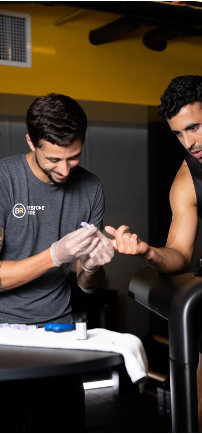
Unlocking Endurance Potential: Pre-Season Testing for Optimal Performance and Injury Prevention
Testing Endurance Athletes During Pre-Season
Pre-season is a crucial period for endurance athletes as they lay the foundation for their upcoming season. It is during this time that athletes focus on improving their fitness, refining their skills, and setting performance goals. Testing endurance athletes during the pre-season plays a vital role in assessing their current capabilities, identifying areas for improvement, and tailoring training programs to maximise their potential. Let’s delve into the various aspects of testing endurance athletes during this critical phase.

Baseline Assessment: The pre-season begins with a comprehensive baseline assessment to establish an athlete’s starting point. This assessment typically includes a range of tests such as body composition analysis, cardiovascular fitness assessments, and strength evaluations. These tests provide valuable data to determine an athlete’s strengths, weaknesses, and overall readiness for the upcoming season.
Cardiovascular Fitness: Endurance athletes rely heavily on their cardiovascular system, so testing their aerobic capacity is essential. Common tests like the VO2 max test, lactate threshold test, and submaximal endurance tests can provide valuable information about an athlete’s cardiovascular fitness. These assessments help coaches and trainers set appropriate training zones, monitor progress, and design targeted workouts to enhance endurance.
Strength and Power: While endurance sports primarily focus on aerobic fitness, strength and power are also critical for optimal performance. Assessing an athlete’s strength levels through tests like one-repetition maximum (1RM) tests or functional movement screenings helps identify muscular imbalances and areas requiring attention. Strength training can then be incorporated into the pre-season regimen to improve performance and reduce the risk of injury.
Sport-Specific Skills: Endurance athletes often require specialized skills related to their sport. For example, cyclists may undergo bike-fit assessments to optimize their position and efficiency on the bike. Runners may have gait analyses to identify biomechanical issues and improve running form. Triathletes and swimmers should undergo periodic swim stroke analyses to maximize hydrodynamic and efficiency in the water, Testing these sport-specific skills allows coaches to address technique, implement corrective measures, and enhance performance.

Download our app and book your running analyses: Available on APPLE & ANDROID
Recovery and Injury Prevention: Testing during the pre-season also includes assessing an athlete’s recovery capabilities and susceptibility to injuries. Tests such as heart rate variability (HRV) monitoring, functional movement screens, and muscle balance assessments can help identify risk factors for injuries and develop tailored injury prevention strategies. Understanding an athlete’s recovery patterns helps optimize training load and ensure adequate rest and regeneration.

Download our APP and book your free posture assessment; Available on APPLE & ANDROID
Monitoring Progress: Testing is not a one-time event but an ongoing process. Regular reassessment throughout the pre-season allows coaches and trainers to monitor an athlete’s progress, adjust training programs, and ensure they are on track to meet their goals. Periodic testing can provide valuable feedback on the effectiveness of the training strategies implemented, enabling necessary modifications to optimize performance gains.
In conclusion, testing endurance athletes during the pre-season is a comprehensive and multi-faceted process. It involves assessing various aspects of an athlete’s physical and mental capabilities, identifying strengths and weaknesses, and tailoring training programs accordingly. By conducting thorough assessments, coaches and trainers can design individualized plans that maximize performance, minimize the risk of injury, and help athletes reach their full potential in the upcoming season.
#EnduranceAthletes #PreSeasonTesting #AthleteAssessment #OptimizePerformance #InjuryPrevention
Coach Leo